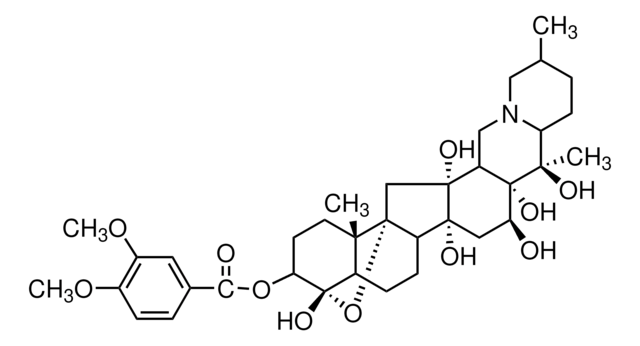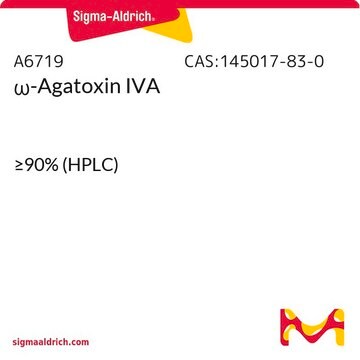SML0385
ML218
≥98% (HPLC)
Synonyme(s) :
3,5-Dichloro-N-[[(1α,5α,6-exo,6α)-3-(3,3-dimethylbutyl)-3-azabicyclo[3.1.0]hex-6-yl]methyl]benzamide, CID 45115620, VU0413807, VU0424199-1
About This Item
Produits recommandés
Niveau de qualité
Pureté
≥98% (HPLC)
Forme
powder
Couleur
white to beige
Solubilité
DMSO: 10 mg/mL (clear solution)
Température de stockage
2-8°C
Chaîne SMILES
CC(C)(C)CCN1C[C@H]2C(CNC(=O)c3cc(Cl)cc(Cl)c3)[C@H]2C1
InChI
1S/C19H26Cl2N2O/c1-19(2,3)4-5-23-10-16-15(17(16)11-23)9-22-18(24)12-6-13(20)8-14(21)7-12/h6-8,15-17H,4-5,9-11H2,1-3H3,(H,22,24)/t15-,16-,17+
Clé InChI
GSJIGYLGKSBYBC-OSYLJGHBSA-N
Application
- T-type channel blocker to test its effect on the nociceptive behavior associated with homocysteinemia rats
- T-type voltage-sensitive calcium channel (VSCC) inhibitor in osteoblasts
- T-type calcium channel blocker to test its effect on the viability of neural progenitor cells
Actions biochimiques/physiologiques
Caractéristiques et avantages
Code de la classe de stockage
11 - Combustible Solids
Classe de danger pour l'eau (WGK)
WGK 3
Point d'éclair (°F)
Not applicable
Point d'éclair (°C)
Not applicable
Certificats d'analyse (COA)
Recherchez un Certificats d'analyse (COA) en saisissant le numéro de lot du produit. Les numéros de lot figurent sur l'étiquette du produit après les mots "Lot" ou "Batch".
Déjà en possession de ce produit ?
Retrouvez la documentation relative aux produits que vous avez récemment achetés dans la Bibliothèque de documents.
Articles
We offers many products related to calcium channels for your research needs.
Notre équipe de scientifiques dispose d'une expérience dans tous les secteurs de la recherche, notamment en sciences de la vie, science des matériaux, synthèse chimique, chromatographie, analyse et dans de nombreux autres domaines..
Contacter notre Service technique








